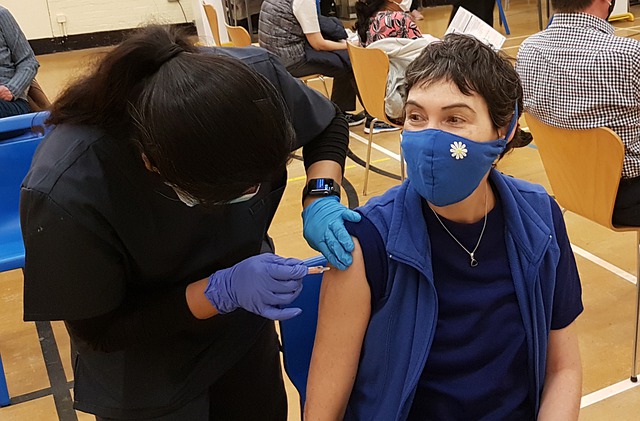Does the COVID-19 Vaccine Cause Menstrual Disorders?
- Normal Liver Cells Found to Promote Cancer Metastasis to the Liver
- Nearly 80% Complete Remission: Breakthrough in ADC Anti-Tumor Treatment
- Vaccination Against Common Diseases May Prevent Dementia!
- New Alzheimer’s Disease (AD) Diagnosis and Staging Criteria
- Breakthrough in Alzheimer’s Disease: New Nasal Spray Halts Cognitive Decline by Targeting Toxic Protein
- Can the Tap Water at the Paris Olympics be Drunk Directly?
Does the COVID-19 Vaccine Cause Menstrual Disorders?
- Should China be held legally responsible for the US’s $18 trillion COVID losses?
- CT Radiation Exposure Linked to Blood Cancer in Children and Adolescents
- FDA has mandated a top-level black box warning for all marketed CAR-T therapies
- Can people with high blood pressure eat peanuts?
- What is the difference between dopamine and dobutamine?
- How long can the patient live after heart stent surgery?
Does the COVID-19 Vaccine Cause Menstrual Disorders?
A recent study from Sweden, published in The BMJ, suggested that nearly 3 million women were at increased risk of menstrual changes after being vaccinated against COVID-19, but there was no conclusive evidence for this.
The study highlights that the relationship between postmenopausal bleeding and COVID-19 vaccines is weak and inconsistent. Likewise, menstrual disturbances and premenstrual bleeding were not consistently associated with vaccines.

The findings do not provide any substantial support for a causal relationship between COVID-19 vaccination and diagnoses related to menstrual or bleeding disorders, the researchers said.
Many women reported changes in their periods after getting the COVID-19 vaccine, such as the number of bleeding days and the amount of bleeding. Self-reporting may capture incidents that would not normally bring them into direct contact with a healthcare facility, but may still cause enough distress to the affected women. However, calculating the strength of potential associations from self-reports may not be reliable.
To address this question, researchers in Sweden used high-quality health registration data to assess the risk of menstrual disturbances and bleeding after vaccination against COVID-19 in 2,946,448 women aged 12-74 years between December 2020 and February 2022.
Healthcare exposures included primary care visits, specialist outpatient visits, and hospital days related to menstrual disturbance or bleeding around menopause.
Degree of risk by vaccine (Pfizer-BioNTech, Moderna or Oxford-AstraZeneca) and dose (naive and first, second and third doses) in two time windows (1-7 days, considered control period; 8-90 days) for evaluation.
In the analysis, more than 2.5 million (88%) women received at least one COVID-19 vaccine, and more than 1.6 million (64%) vaccinated women received three doses of the vaccine during the study period.
The highest risk of bleeding in postmenopausal women occurred in the 1-7 day risk window (28%) and 8-90 day risk window (25%) after the third dose. Adjusting for socioeconomic factors, prior health care use, and some specific medical conditions had little effect on these results.
An analysis of the individual vaccines and the risk of postmenopausal bleeding showed a 23%-33% increased risk after 8-90 days for the Pfizer-BioNTech vaccine and a 23%-33% increased risk for Moderna after the third dose, but not the same as the Oxford- The relevance of AstraZeneca’s vaccine is not obvious.
Among premenopausal women, a weaker association was found for menstrual disturbance or bleeding after any dose of the vaccine (13% or 8%, respectively, after 1-7 days, and 6% or 1%, respectively, after 8-90 days). However, adjusting for other factors almost completely eliminated these weak associations, suggesting that a causal effect is unlikely.
These are observations, and the authors point to limitations, including that the time interval between onset, onset of symptoms, and exposure to healthcare facilities can be considerable, making it challenging to interpret the impact of different risk windows.
But this was a large study, using mandatory data from a nationwide registry, with nearly complete follow-up.
Thus, they say: “We observed weak and inconsistent associations between SARS-CoV-2 vaccination and medical exposure for postmenopausal bleeding, and even less consistent associations with menstrual disturbances and premenstrual bleeding, and these findings do not Provide any substantial support for a causal relationship between SARS-CoV-2 vaccination and medical exposure associated with menstrual disturbances or bleeding disorders.”
Does the COVID-19 Vaccine Cause Menstrual Disorders?
(source:internet, reference only)
Disclaimer of medicaltrend.org
Important Note: The information provided is for informational purposes only and should not be considered as medical advice.



